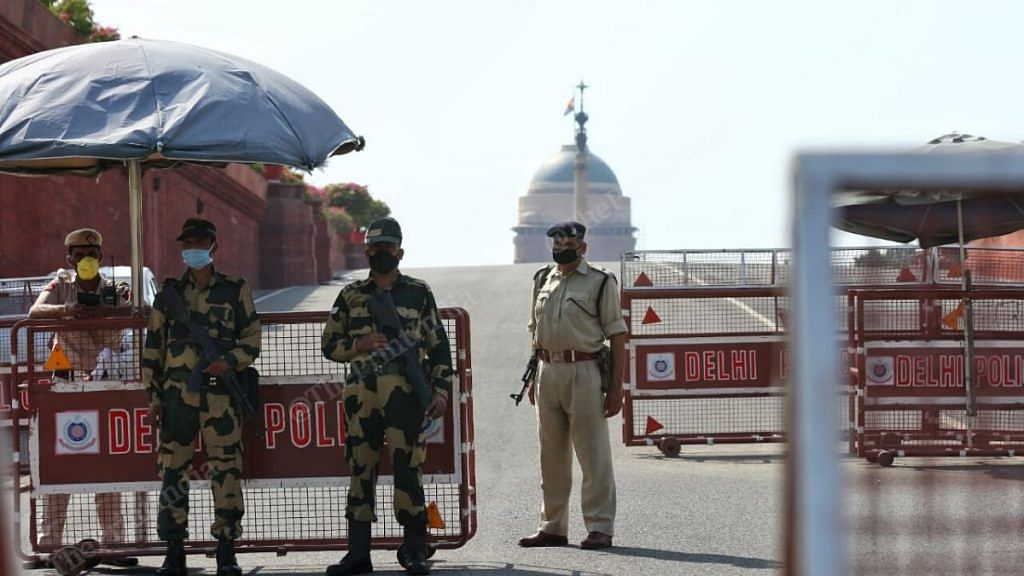New Delhi: To tackle the coronavirus crisis, Prime Minister Narendra Modi put in effect a complete nationwide lockdown for 21 days beginning Tuesday midnight. Essential services including grocery stores, dairy booths, ATMs, pharmacies and other medical services will, however, function unaffected, according to government guidelines.
The Ministry of Home Affairs issued the guidelines soon after Modi made the announcement, ensuring ration shops dealing with food, groceries, fruits and vegetables, dairy and milk booths, meat and fish, animal fodder, remain operational.
A quick list on what remains open and functional
— Delivery of all essential goods including food, pharmaceuticals, medical equipment through e-commerce is permitted.
— District authorities are encouraged to facilitate home delivery to minimise the movement of individuals outside their homes.
— Petrol pumps, LPG and petroleum and gas retail and storage outlets will be open.
— Financial services which includes banks, insurance offices and ATMs to continue running as before.
— Telecommunications, internet services, broadcasting and cable services will remain operational.
— Print and electronic media, which count as essential services, will be allowed to move around for work.
Also read: 8 steps to make Indian systems work smoothly in a coronavirus lockdown
Transit pass required
In order to facilitate smooth and uninterrupted operations of the essential services and commodities, and to ensure the effective operation of the lockdown, the government has put in place a standing operating procedure (SOP).
According to this, employees with essential services run by the government and public sector undertakings will be allowed to move around in and out of Delhi if they produce their ID card when required.
Those who are requisitioned for providing essential services and are not permanent government employees shall be allowed movement using a pass issued by the the authority concerned.
Outsourced and contractual employees engaged by government departments in providing essential services will also require passes.
“Healthcare personnel of private sector including doctors, paramedicals, will be allowed to move on production of their I-cards. But self-employed doctors will have to produce I-card issued by regulatory authority or related government organisation,” a senior MHA official said.
“All other essential service providers in the private sector will be allowed to move on production of pass,” he added.
Moreover, vehicles engaged in the transport of essential commodities will have to get a vehicular pass for unrestricted movement.
Also read: At current rate, India can see 30,000 COVID-19 deaths by May, no hospital bed by June: Data
Getting a pass through WhatsApp, email
According to the SOP, the passes will be issued by the office of the district magistrate concerned, and can be obtained online or through WhatsApp.
To apply through WhatsApp, applicants can send a message with their particulars and relevant documents pertaining to their identity to authorised mobile numbers corresponding to their area, i.e., East, West, Southeast, Northeast, Central, South, New Delhi, Southwest, North, Northwest and Shahadra (see below).
“The e-pass will be received on the WhatsApp of the applicant and shall be valid,” the officer said.
To apply online, one should email ddma.delhi@nic.in with their particulars, and will receive the pass on their provided email ID.
However, the passes will be issued only after the office of the district magistrate concerned clears a request.
Below are the authorised WhatsApp numbers, as provided by the government:
- East: 8447200084 / 8375878007
- North East: 9540895489 / 8860425666
- Central: 7428336279 /7428210711
- New Delhi: 9540675392 / 9873743727
- North: 8595298706 / 8595354861
- South East: 8595246396 / 8595258871
- West: 9414320064 / 8595252581
- South: 9599649266 / 9643150027
- South West: 9971518387 / 9971526953
- North West: 8595559117 / 8595543375
Also read: If India has to control coronavirus pandemic, it must contain 4 other contagions as well
Public advised to stay home
The guidelines state that the public should not move out unless absolutely necessary and that use of a vehicle should be curtailed to the minimum.
“Movement out of home should be done for only procurement of essential services or only if necessary for medical exigency,” the officer said.
Delhi residents stranded outside the city will be allowed entry into the capital on production of a valid ID or residence proof.
Also read: Covid-19 impact in India: A look at the statistics, the science and the reality
Control room set up
A 24X7 control room is also being set up in the office of the Divisional Commissioner of the Government of NCT of Delhi (GNCTD) and also at the officers of the District Magistrates of GNCTD.
“An officer of ACP (additional commissioner of police) will be present there and coordinate with the DCs (divisional commissioners),” the officer said.
Nodal officers have also been deployed at inter-state border check-posts to ensure strict enforcement of the lockdown.
“A personnel not below the rank of Sub Inspector and a senior revenue official will be available at inter-state border check-posts to facilitate seamless movement of vehicles of essential services,” the SOP said.
Also read: This online test can help you determine if you are at risk of contracting coronavirus
